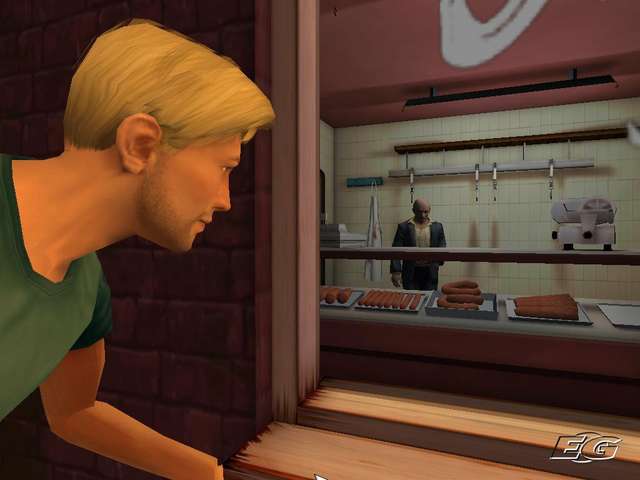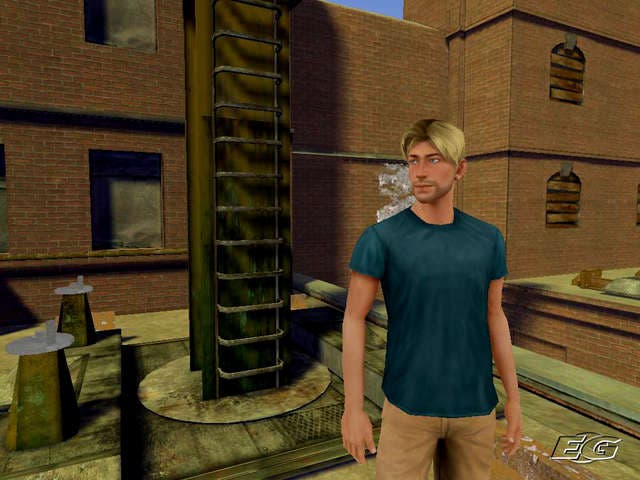Live by the Sword...
Charles Cecil on Broken Sword 4, Beneath a Steel Sky and more.
With all of these games, you see how well it does. I have no idea whether there's going to be another Broken Sword. I'm not working on one at the moment. If the game is successful, then it would be great to write another one. If people feel we've reached the end of the road, then we'll accept that.
I'm not attempting to do a Final Fantasy, where you start writing the sequel half way through the original. I think Broken Sword 4 will come out three years after Broken Sword 3. Two years would be a better time scale, but if you keep churning them out on a regular basis, people get bored.
One of the things that's really flattering is that we have an enormous amount of loyalty, and part of that comes from the fact that we don't churn them out. We think very hard about each one, we put a lot of effort and energy into the stories.
Beneath A Steel Sky is very interesting. I have an enormous amount of admiration for Scumm VM, who wrote an emulator so that the game could be played on a range of machines. The game was released in about 1993, so it's extremely old, and it just wasn't working on up to date operating systems.
Scumm VM came along, we gave them the source code, they wrote an emulator, and they made it work. As far as I'm concerned, they're offering their software for free; I thought there's no reason why we shouldn't offer Beneath A Steel Sky for free. I wish I could say that as a marketing genius I planned it, but that would be a dreadful lie.
The result is that literally millions of people have played the game for free on a very wide range of devices. We're coming under enormous pressure from people saying, 'When's there going to be a Steel Sky 2?', so from a commercial perspective, there's a great deal to suggest that the game could be very well received. There's a lot of interest in it.
The only thing is, if we were to do a Steel Sky 2 - and this is something that I'm looking into - then I'd dearly love to work with Dave Gibbons again, because his input last time around was great. Dave and I communicate from time to time, and he's always expressed an interest in working on a sequel.
But if we were to do it, I think it would have to be a different approach. It would have to be either an episodic game, or there has to be some other way of getting it to market in a new and interesting way. So that's something that's very much on the horizon, but not something I'm actively working on at the moment.
For me, working on a combination of original titles to which we own the IP and other people's titles works very well, and that's what I intend to continue to do. I am about to go onto another project which is an existing IP.

Yes, absolutely. I enjoy it enormously, and it allows me to see the ways other developers are working. One of the problems with Revolution as it stood was that for two years I was in a little bubble, as was my team, and I did nothing but work on Broken Sword. At the end of it, I had to go straight onto a new project; there was no time to catch a breath.
We had some really good guys, a terrific team, but we were writing one project at a time. And at the end of that project, if we didn't have something else to go on to, we had to make people redundant - so people had gone through an incredible crunch period, and that was their reward. It was terrible.
We had a project canceled, and I had no choice but to scale right back. In hindsight, it was an extremely good thing to do. Now I partner with larger developers - in the case of Broken Sword 4, we're working with Sumo, who have a team of about 60 to 70 people, and they have the flexibility to move people between projects.
Obviously, if you're only working on one title, you have no flexibility whatsoever. The model at Revolution worked up until 2003 when we released Broken Sword 3 - actually, I would argue that it stopped working some time before then, it was absolutely unsustainable.
Working with Sumo has allowed me to see how other people work, to get new ideas; frankly, as well as being a much more productive and efficient way of working, it's also much more fun.
The key thing is that it's actually more difficult to be creative when you have enormous overheads, because of the pressures that you're put under. Revolution now has a miniscule overhead, so it doesn't matter if an idea doesn't get signed for three, six or nine months. Previously, it would matter desperately.
We're in a much stronger position now - I'm very happy to work on the project and design it, with very low overheads, until the point at which it gets taken on. Then we'll work with a partner, like Sumo, who will be able to react very quickly and build a team up.
Absolutely. For Broken Sword 4, we've pulled a team of people together, the best people that I could find, and the game will be much better for it.
No.

I think the industry is being split between the massive budgets that people are talking about for next-gen, and if you go to the other end, DS titles, which are still - in comparison - extraordinarily cheap to write. I would be delighted to contribute to next-gen, but if there's a project that I'm going to handle, I'd much prefer a smaller budget.
Not least because you're much more likely to recoup royalties. If a game costs $10 million to write, the chances of actually recouping and earning a royalty is tiny. If a game is costing, at the DS level, several hundred thousand pounds, then it becomes much more viable economically. I write a game in the hope that it's going to be creatively successful, but also financially successful, and that royalties get paid out.
Absolutely. I think silly is the right word. The bigger developers talk about games costing tens of millions of dollars; it seems patently obvious to me that they don't need to cost that much, unless, as with a big film budget, you're paying certain key individuals enormous amounts of money.
Part of the reason that Hollywood films cost so much is the enormous wage bill of the actors. I can only assume that the reason the budgets are quite so enormous is because key staff are being paid a huge amount.
It costs X to model a character in 10,000 polygons for Broken Sword 3. It doesn't cost very much more to model it in greater detail for a next-gen title. So there's something slightly strange going on.
EA talks about the fact that they've got teams of 150 people working on a project. To me, that just can't be efficient, either commercially or creatively. I'm not quite sure how these companies have got into the state where they feel that they need to have such enormous teams.
I think they want to squeeze the development period, first and foremost. That in itself is probably dangerous, because you reduce by a long way your opportunity for any kind of creative flexibility. A lot of criticism is levelled at these very expensive projects that they lack soul, and I think part of the problem is that they're written too quickly.
In an ideal world, you'd come up with a game design document that specified exactly what that game was going to do and how it would play at the very beginning. Indeed, it's vital that you do come up with that, but through development you've got to be prepared to change, because, yes, you can prototype a certain amount, but you can't prototype everything. If you squeeze the development time too greatly, then you limit your ability to adjust and tweak the feeling of the game.
The other thing is, people want to produce games with the most extraordinary production values, and they're prepared to pay enormous amounts to do that.
I've been away this week, so I haven't read much about it. But I think how an event that was patently so successful could go off the rails in such a short time - I suspect there are some fairly intransigent people, as is so often the way, who would prefer to see the thing disintegrate rather than compromise. But I need to read more about it.
Broken Sword: The Angel of Death is due for release on September 15th on PC. Check back during release week for a full, in-depth review of the game.








